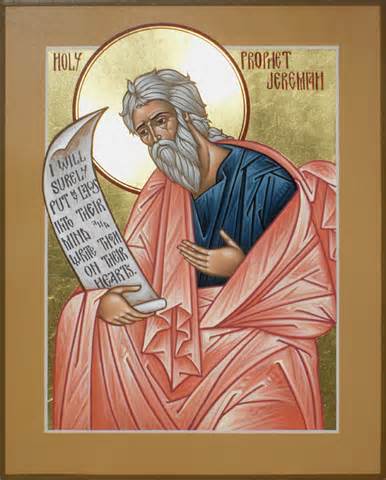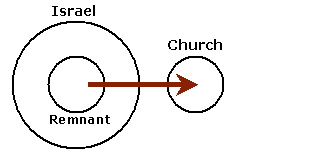
Behold, the days come, saith the LORD, That I will make a new covenant with the house of Israel, and with the house of Judah. (Jeremiah 31:31)
Compare:
For finding fault with them, He saith, Behold, the days come, saith the Lord, when I will make a new covenant with the house of Israel and with the house of Judah:... (Hebrews 8:8)
This writing, and the next three, will be revisiting the four prophets that were introduced in a previous article entitled: “Did the Prophets Write of the Church.” These prophets are: Jeremiah, Joel, Amos, and Malachi. The purposes of these four papers will be to examine closer the prophecies of each. By this we will be able to see more clearly the identity of the Church and the identity of the true Israel as one and the same. That is to say: the Church is indeed the Israel of promise.

The Prophets and Apostles agree: the Church is Israel!
Here, we place two companion passages of Scripture under examination: namely, Jeremiah 31:31-34 and Hebrews 8:8-12. It is important that you read these texts before proceeding and keep your Bible always before you so you can follow there what you read here. Yahweh, speaking through the prophet Jeremiah, speaks of a New Covenant (Hebrews 8:8) that would replace the old covenant which Israel had broken (see Jeremiah 31:32). This present letter will address Jeremiah’s prophecy of God’s New Covenant with Israel.
Jeremiah 31:31-34 “Behold, the days are coming, says the Lord, when I will make a new covenant with the house of Israel and with the house of Judah— 32 not according to the covenant that I made with their fathers in the day that I took them by the hand to lead them out of the land of Egypt, My covenant which they broke, though I was a husband to them, says the Lord. 33 But this is the covenant that I will make with the house of Israel after those days, says the Lord: I will put My law in their minds, and write it on their hearts; and I will be their God, and they shall be My people. 34 No more shall every man teach his neighbor, and every man his brother, saying, ‘Know the Lord,’ for they all shall know Me, from the least of them to the greatest of them, says the Lord. For I will forgive their iniquity, and their sin I will remember no more.”Hebrews 8:8-12 "Because finding fault with them, He says: “Behold, the days are coming, says the Lord, when I will make a new covenant with the house of Israel and with the house of Judah— 9 not according to the covenant that I made with their fathers in the day when I took them by the hand to lead them out of the land of Egypt; because they did not continue in My covenant, and I disregarded them, says the Lord. 10 For this is the covenant that I will make with the house of Israel after those days, says the Lord: I will put My laws in their mind and write them on their hearts; and I will be their God, and they shall be My people. 11 None of them shall teach his neighbor, and none his brother, saying, ‘Know the Lord,’ for all shall know Me, from the least of them to the greatest of them. 12 For I will be merciful to their unrighteousness, and their sins and their lawless deeds I will remember no more.”
The old (former) covenant that was to be replaced was not the Abrahamic, but the Sinaitic. Jeremiah is clear about this fact. See, for instance, Jeremiah 31:32, “Not according to the covenant that I made with their fathers in the day that I took them by the hand to bring them out of the land of Egypt; which my covenant they brake, although I was an husband unto them, saith the LORD:”
One must not think that the covenant which God made with Abraham is to be put aside; it is the covenant of the Law of Moses made at Sinai that had fault (see Hebrews 8:7). The “fault” lay in the inability of the people to keep the covenant requirements. (This truth is established in Hebrews 8:8-13 when viewed with Romans 7:7-25.) Jeremiah writes of the LORD’S promise to “write” the laws of this new covenant “in their hearts” (see Jeremiah 31:33 compared with Hebrews 8:10 and 10:16). That is to say: whereas the covenant of Sinai placed the law in the mind, it was powerless to change the heart; the “New Covenant” would, in fact, change the heart so that its people would not only ‘know” the law, but would actually possess the desire (and nature) to obey it. This, the New Testament calls the New Birth.
Moreover, the promise is to make this “new covenant” with the houses of Israel and Judah (Jeremiah 31:31). (Jeremiah prophesied at a time after the division of the twelve tribes. Ten northern tribes broke away after the death of Solomon and retained the name Israel; the two southern tribes [Judah and Benjamin] were known as Judah. The northern nation of Israel fell to the Assyrians in 722 B.C. and no longer existed at the time of Jeremiah’s prophecy. Jeremiah is given this prophecy even as the Babylonians are about to do the same with Judah [585 B.C].) These circumstances make Jeremiah’s prophecies amazing promises: though both Israel and Judah would be defeated and scattered throughout the habitable earth the “new covenant” would be established with them—not another.
Christianity is the fulfillment of Jeremiah’s prophetic promise of a new covenant with the houses of Israel and Judah. That being true, one must see all twelve tribes represented in Jerusalem on the feast of Pentecost, in that the author of Hebrews, writing under the inspiration of the Holy Ghost, identifies A.D. 30 (see Acts 2:5-11) as the establishing of Jeremiah’s new covenant. Indeed, the Assyrians and Babylonians had scattered the house of Israel and the house of Judah over the earth, but in A. D. 30 they returned from the Parthian Empire, Media, Elam, Mesopotamia, Cappadocia, Pontus, Asia, Phrygia, Pamphylis, Egypt, Cyrene, Rome, Crete, and Arabia to Jerusalem for the establishing of Jeremiah’s “new covenant”. On that day 3,000 were baptized into the covenant name of Jesus (Acts 2:41); all 3,000 were Jews of the house of Israel and the house of Judah – the twelve tribes. Later, as a result of the healing of the lame man (Acts 3:1-16), and the preaching of Peter, 5,000 men believed (Acts 4:4); add to that number their women and children – all were Jews of the houses of Israel and Judah (the twelve tribes). By Acts 5:14 the disciples became too numerous to count and are referenced simply as “multitudes” – all were Jews of the houses of Israel and Judah (the twelve tribes). These are the “elect” that Paul writes of in Romans 11:1-5,7 who are the spiritual olive tree that was “born again” (John 3:3-10) from its former state as a natural tree. These are the Israel of promise (Romans 9:6-8; see Galatians 3:16-18; 4:22-31).
Now, God, having established His “new covenant” with the houses of Israel and Judah (as promised) provides a means of including the whole world (Gentiles) into Israel’s new covenant. Paul refers to this as a “grafting”—when the allegory is a tree (Romans 11); “adoption”—when the allegory is a family (Romans 8:15; Galatians 4:5; Ephesians 1:5). The imagery is clear: the grafted branches become the tree they are grafted into; the adopted children become the family they are adopted into. If the tree is the house of Israel and Judah—if the family is the house of Israel and Judah then the “grafted” and the “adopted” ones become the house of Israel and Judah—the twelve tribes. This truth is demonstrated in the New Testament when James writes, to Christians in general, and addresses his letter to them in the following manner: “to the twelve tribes” (see James 1:1).
The author of Hebrews declares the new covenant to be a “better covenant, which was established upon better promises” (Hebrews 8:6). At least two promises are better: namely,
- the covenant members will have their sins removed (remitted) by the blood of Jesus (Jeremiah 31:34; Hebrews 10:16-18);
- the covenant members will receive the law of God in their hearts, not only in their minds; they will, therefore, be empowered to true holiness (Hebrews 8:10-11; Jeremiah 31:33-34; see John 17:17).
In that Jeremiah’s prophetic promise of a “new covenant” indicates the condition of the Messiah’s Kingdom, and in that the author of Hebrews proclaims the New Testament Church to be the fulfillment of that prophecy, the Christian should not expect any future covenant to be made with natural Israel for the purpose of establishing a future Messianic Kingdom Age.
Of course, an entire book could (and mostly likely should) be written from Jeremiah 31:31-34, but this small letter will, I trust, be sufficient for the purpose at hand. It is my humble prayer that you my children prayerfully hide these things in your hearts.
My prayer, as always, is that the God of all peace keep you in His unfailing love.
Apostolically Speaking
☩☩ Jerry L Hayes
(Mar David Ignatius)
The above article is an excerpt from my book entitled "Letters to My Children on Apostolic Kingdom Theology." "Letters" is a compilation of twenty-four letters I wrote to my children mapping my conversion from Dispensationalism to Realized Millennialism. If you are interested in the study of eschatology I am sure you will want this book. Order your personal copy today from the link provided here:
https://www.amazon.com/Letters-Children-Apostolic-Kingdom-Theology/dp/1482716712/ref=sr_1_fkmr1_1?keywords=letters%2C+bishop+jersey+hayes&qid=1559362891&s=books&sr=1-1-fkmr1
(Mar David Ignatius)
The above article is an excerpt from my book entitled "Letters to My Children on Apostolic Kingdom Theology." "Letters" is a compilation of twenty-four letters I wrote to my children mapping my conversion from Dispensationalism to Realized Millennialism. If you are interested in the study of eschatology I am sure you will want this book. Order your personal copy today from the link provided here:
https://www.amazon.com/Letters-Children-Apostolic-Kingdom-Theology/dp/1482716712/ref=sr_1_fkmr1_1?keywords=letters%2C+bishop+jersey+hayes&qid=1559362891&s=books&sr=1-1-fkmr1
THANK YOU FOR YOUR SUPPORT BY PURCHASING MY BOOKS FOR YOUR LIBRARY. -JLH
Be sure to listen and subscribe to the Bishop's Podcast: Apostolic Bishop, at:
Read other epistles from the Bishop on eschatology:
God’s New Covenant With Israel
Apostolic Eschatology
The Prophets Speak of the Church
Apostolic Kingdom Theology vs Futurism
Dating the Book of Revelation
Prophecy and the Spiral Staircase
The Three Horsemen of Dispensationalism
Correct Method of Interpreting the Book of Revelation
http://bishopjerrylhayes.blogspot.com/2015/07/correct-method-of-interpreting.html
Joel's Messianic Kingdom (The Church of Jesus Christ)
https://bishopjerrylhayes.blogspot.com/2019/06/joels-messianic-age-church-of-jesus.html
Biblical Eschatology
https://bishopjerrylhayes.blogspot.com/2019/09/biblical-eschatology.html
Millennial Reign of Christ
http://bishopjerrylhayes.blogspot.com/2019/09/millennial-reign-of-christ.html
All These Things (A Study on Matthew 24)
http://bishopjerrylhayes.blogspot.com/2019/09/all-these-things-kingdom-teaching-of.html
Second Coming of Christ Jesus
https://bishopjerrylhayes.blogspot.com/2019/09/second-coming-of-christ-jesus.html
The Crux of the Matter (What Did Jesus Mean By "The Generation"?)
https://bishopjerrylhayes.blogspot.com/2019/09/the-crux-of-matter-what-did-jesus-mean.html
Joel's Messianic Kingdom (The Church of Jesus Christ)
https://bishopjerrylhayes.blogspot.com/2019/06/joels-messianic-age-church-of-jesus.html
Biblical Eschatology
https://bishopjerrylhayes.blogspot.com/2019/09/biblical-eschatology.html
Millennial Reign of Christ
http://bishopjerrylhayes.blogspot.com/2019/09/millennial-reign-of-christ.html
All These Things (A Study on Matthew 24)
http://bishopjerrylhayes.blogspot.com/2019/09/all-these-things-kingdom-teaching-of.html
Second Coming of Christ Jesus
https://bishopjerrylhayes.blogspot.com/2019/09/second-coming-of-christ-jesus.html
The Crux of the Matter (What Did Jesus Mean By "The Generation"?)
https://bishopjerrylhayes.blogspot.com/2019/09/the-crux-of-matter-what-did-jesus-mean.html
The Apocalypse, is the introduction to the biblical book of Revelation. Here Bishop Hayes also gives a verse by verse commentary of the first three chapters of the Apostle John's Revelation of Jesus Christ, covering the letters addressed to the seven churches of Asia Minor. The Bible student will thrill at the Bishop's easy evangelistic style of presenting deep and unique truths never before published. In this study a wealth of information will be shared with the disciples of Christ on each verse of this great manuscript.
Own your personal copy of this enlightening work by ordering at the link provided here:
https://www.amazon.com/Apocalypse-Introduction-Epistles-Seven-Churches/dp/1686423152/ref=sr_1_1?keywords=Bishop+Jerry+Hayes%2C+Apocalypse&qid=1568308793&s=books&sr=1-1
https://www.amazon.com/Apocalypse-Introduction-Epistles-Seven-Churches/dp/1686423152/ref=sr_1_1?keywords=Bishop+Jerry+Hayes%2C+Apocalypse&qid=1568308793&s=books&sr=1-1
THANK YOU FOR YOUR SUPPORT BY PURCHASING MY BOOKS FOR YOUR LIBRARY. -JLH



No comments:
Post a Comment